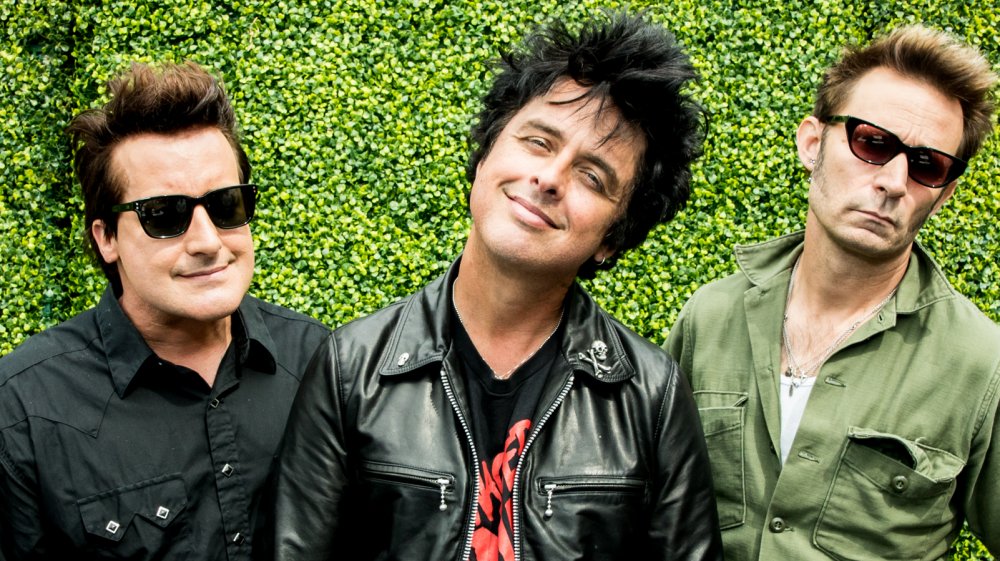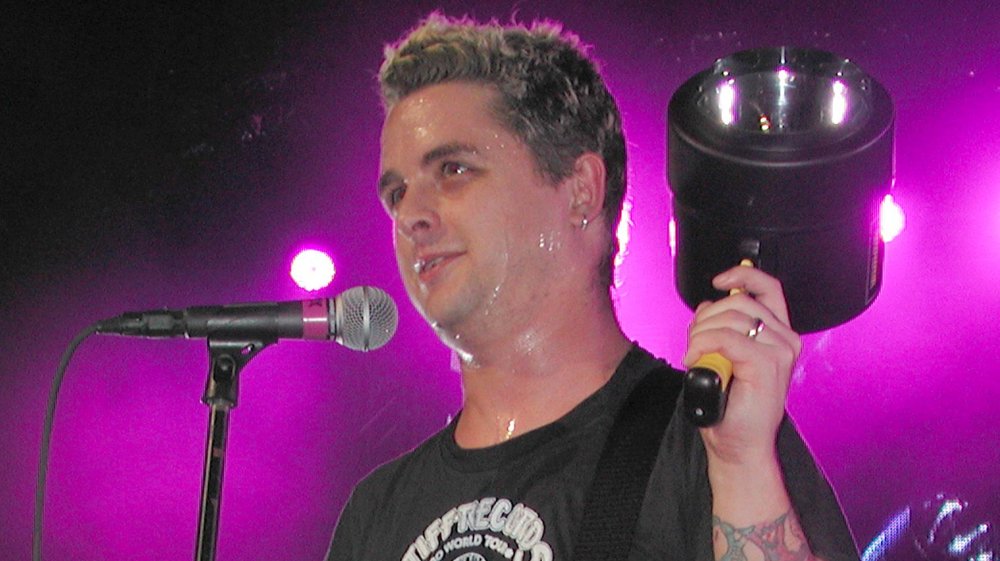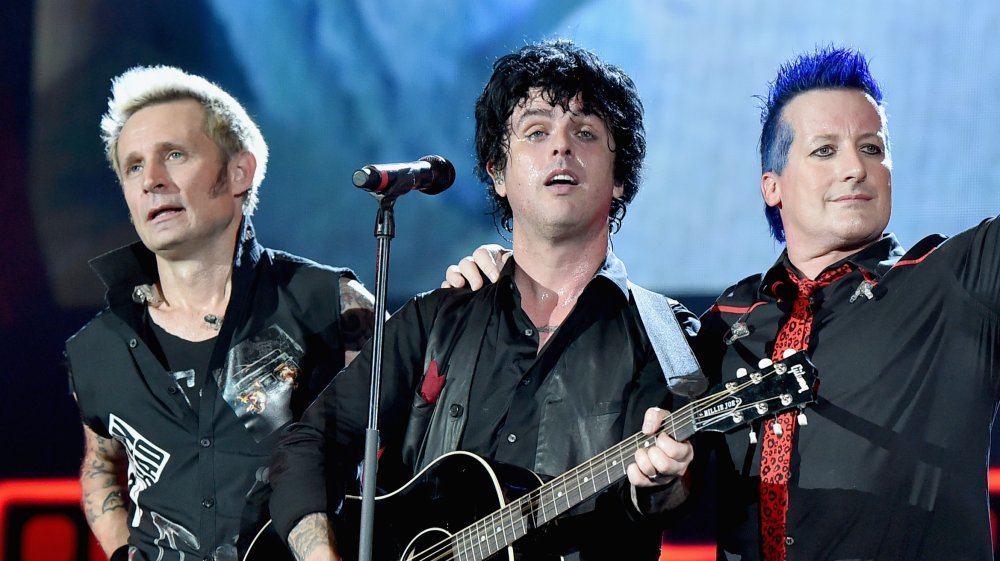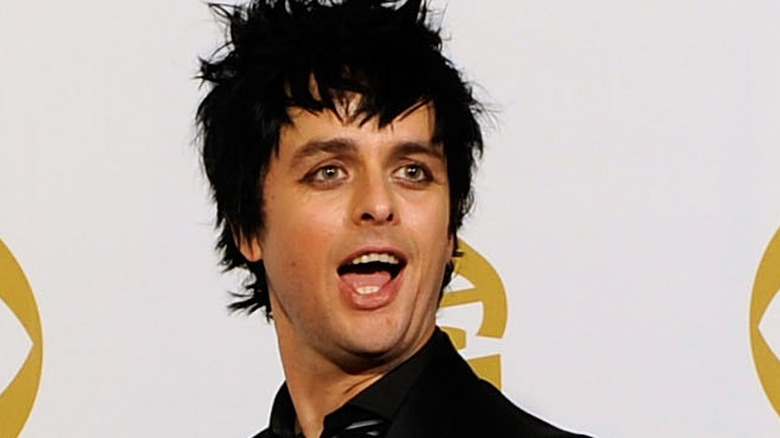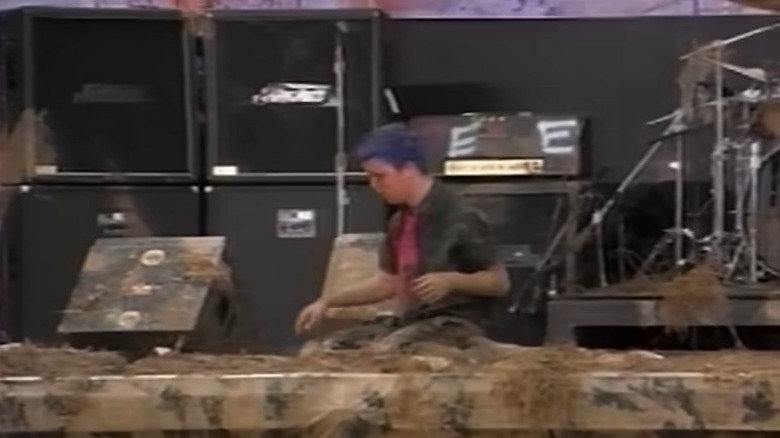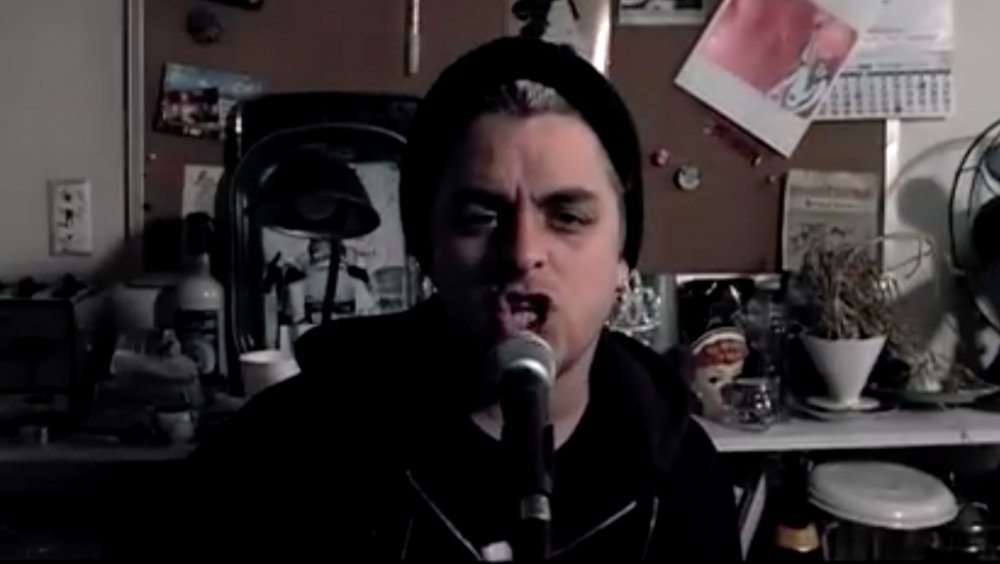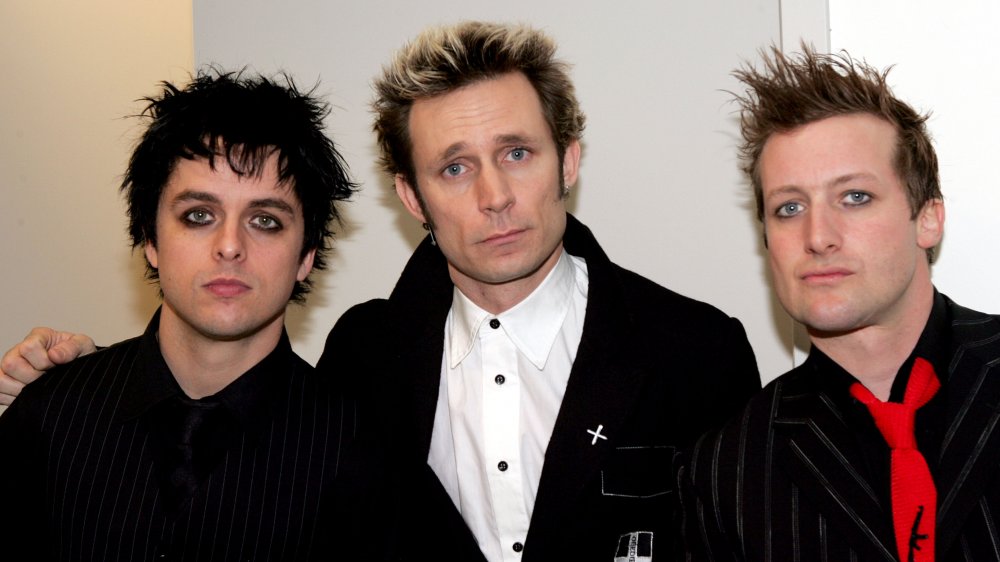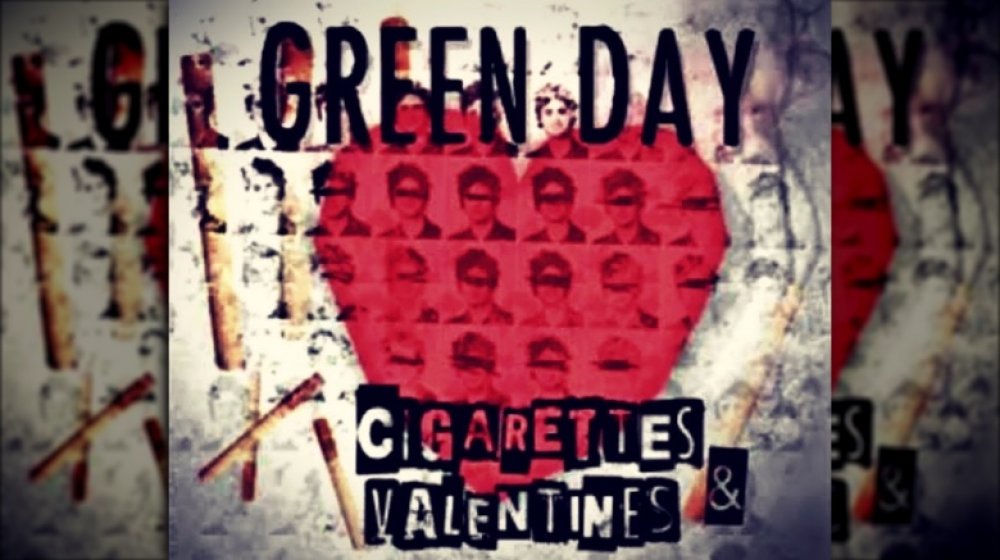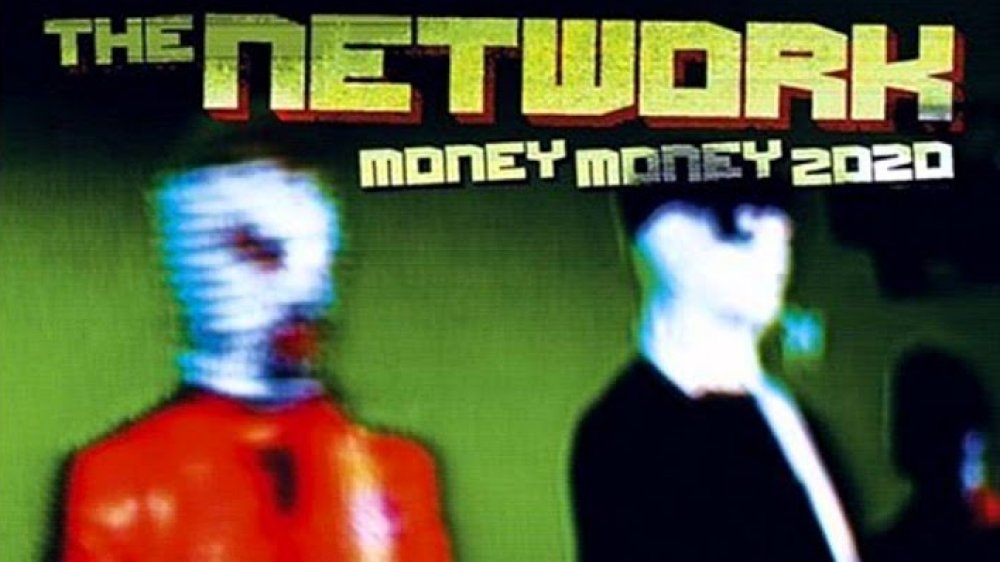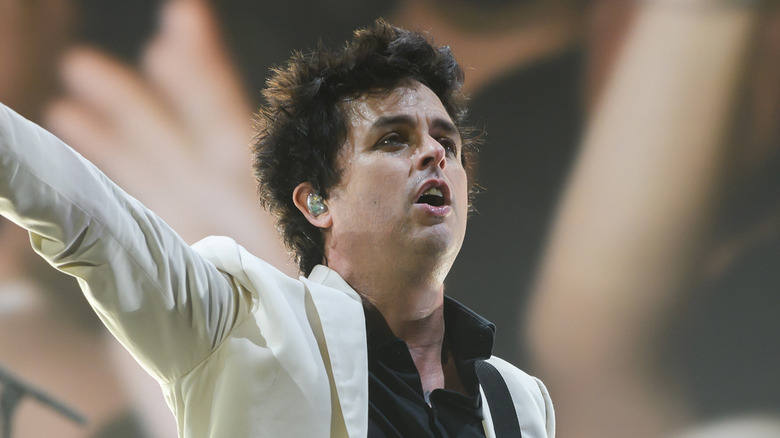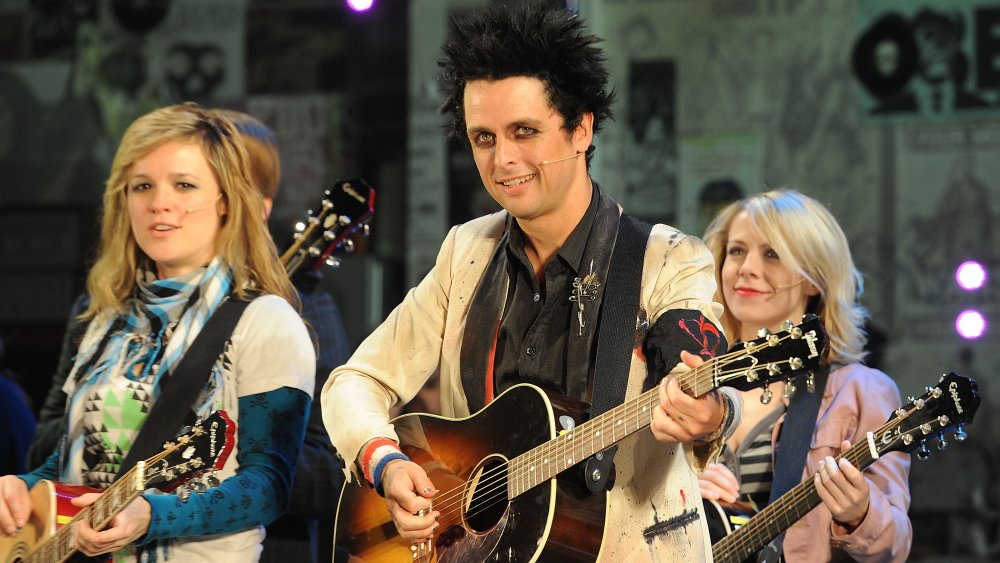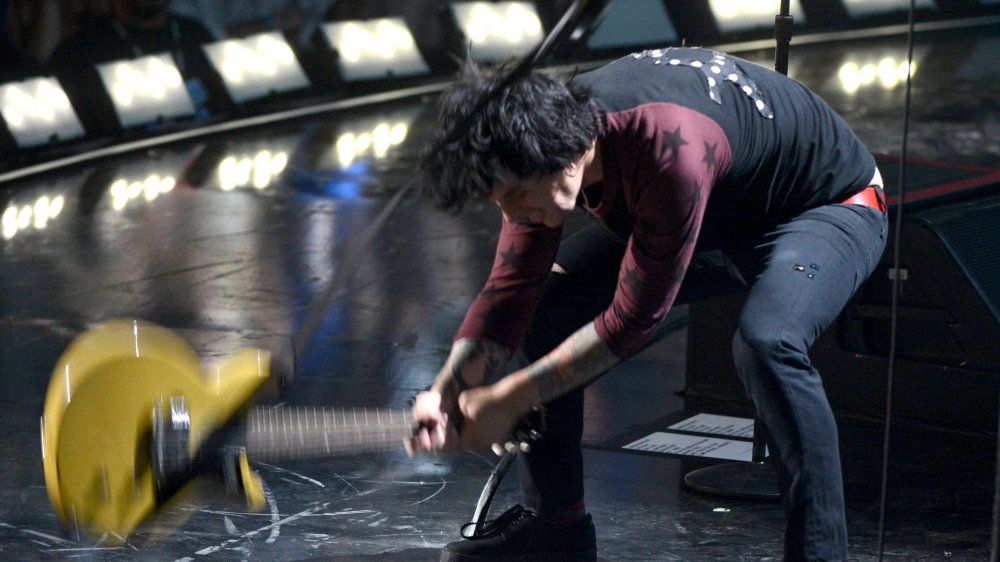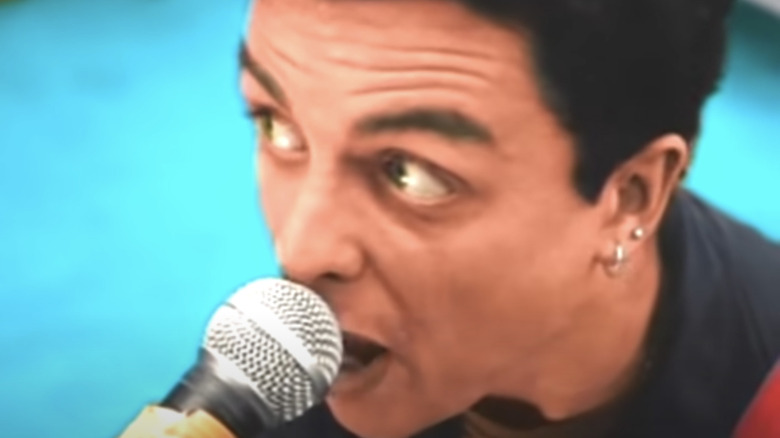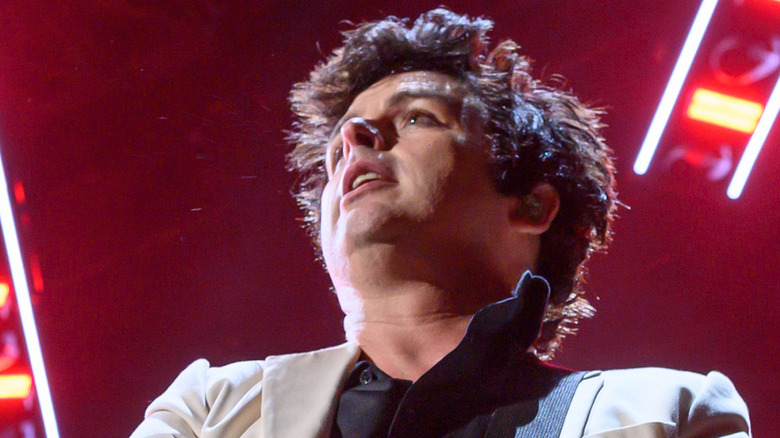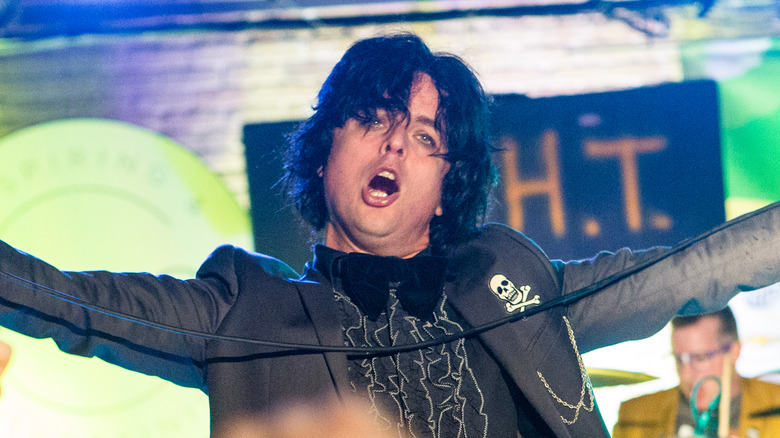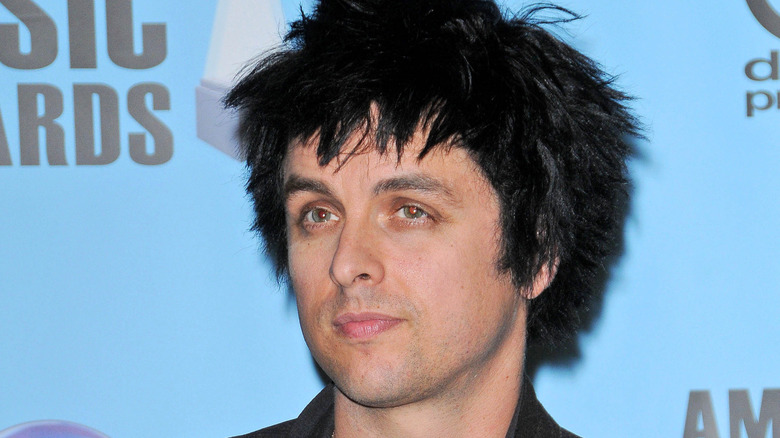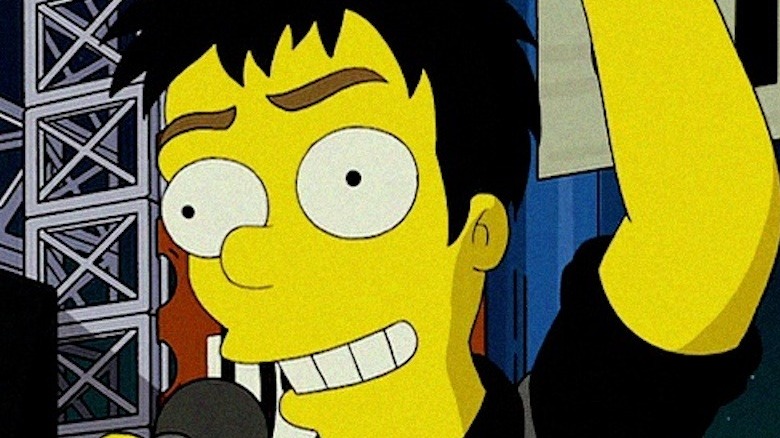The Untold Truth Of Green Day
Right after the death of Nirvana's Kurt Cobain left a massive void in the world of alternative rock, along came Berkeley, California, trio Green Day to bring back punk — both the attitude and the sound. Lead singer and guitarist Billie Joe Armstrong, bassist Mike Dirnt, and drummer Tré Cool provided a sneering, nose-thumbing charisma. Plus, their songs off the mega-hit album "Dookie" (to the tune of 10 million copies sold) had the rapid-fire riffs and humor-and-frustration-filled lyrics down to a science. Radio has rarely been without a Green Day hit since the mid-'90s, with rock standards like "Longview," "Basket Case," "When I Come Around," "Hitchin' a Ride," "Holiday," "American Idiot," and "Boulevard of Broken Dreams."
Expanding out of the punk genre but always sounding like themselves, Green Day went on to become one of the most popular bands in the world over the next 25 years. And when they were enshrined in the Rock & Roll Hall of Fame in 2015, well, that made their incredible career even more impressive. And yeah, they're still rocking to this day. But if you want to know a bit more about the band's story — from their punk origins to their tragic pasts — then bite your lip, close your eyes, and check out this look into the life and times of Green Day.
They were just some Sweet Children once upon a time
Green Day has had the same three members since 1991, a remarkably long run in the fickle world of rock 'n' roll. Billie Joe Armstrong and Mike Dirnt have been around since the band's inception in 1986, with Tré Cool signing on in 1991, providing the final piece of the musical puzzle. In the mid-'80s, teenaged Armstrong and Dirnt teamed up with friends Jason Relva and Sean Hughes to form a band, notes "Green Day: A Musical Biography," by Kjersti Egerdahl. At first, they were a metal band called Condom, then a straightforward group called Desecrated Youth. Things gelled with Dirnt on rhythm guitar and Hughes on bass, another friend named Raj Punjabi on drums, and Relva as an instrumental floater. (Relva died in 1992 at the age of 19, and the Green Day favorite "J.A.R." is about him.)
By 1986, a band that would wind up sounding like Green Day had developed, only it was called Sweet Children (and Dirnt had switched over to bass with Armstrong on guitar). Drummer Punjabi was long gone, and when the band played its first show in 1988 in Berkeley, California, it was with John Kiffmeyer, of the punk band Isocracy, behind the drum kit. His experience in the local musical scene was instrumental in helping the band book gigs and get attention from indie labels. After he decided to attend college full time in 1990, the band now called Green Day had to find a new drummer, and they found a Cool one.
What's your name?
As part of the genre's unrelenting ethic to rebel against anything conventional and mainstream, it's traditional for punk rock musicians to adopt stage names — the funnier, brattier, more threatening, and wordplay-based the better. For example, take '70s punk band Germs, home to musicians Pat Smear and Lorna Doom, or the Sex Pistols, with Johnny Rotten and Sid Vicious. Green Day followed suit, for the most part. The band's bassist was born with the name Michael Pritchard, but he plays under the moniker Mike Dirnt. When he was in elementary school, the future musician liked to play "air bass," and while doing so, he would imitate the sound of the instrument by making a "dirnt, dirnt, dirnt" noise with his mouth. Thus, he became Mike Dirnt.
As for drummer Tre Cool, in the mid-1980s, at the age of 12, he joined Larry Livermore's band the Lookouts, as per HuffPost. At the time, he was just a kid named Frank Wright III. Half the age of his bandmates, Wright struggled to fit in (and play his instrument), and Livermore gave him the ironic nickname Tré Cool, a play on the semi-French phrase trés cool, meaning "very cool," according to "Green Day: American Idiots & New Punk Explosion," by Ben Myers.
Only frontman Billie Joe Armstrong uses his parentally bestowed name.
The one that got away
On February 9, 2011, seemingly out of the blue, Green Day singer Billie Joe Armstrong revealed on Twitter the inspiration for three of the band's best-known songs. According to his tweet, "She," "Sassafras Roots," and "Whatsername" are all about "a girl named Amanda." According to Alan di Perna's "Green Day: The Ultimate Unauthorized History," she's also the subject of "She's a Rebel" and, most intriguingly, the devastating breakup jam "Good Riddance (Time of Your Life)." So who exactly is this Amanda person?
Well, in 1991, after returning home from a club tour, Armstrong broke up with his girlfriend, Erica Paleno, and coupled with a woman named Amanda, a "militant punk rock feminist" he knew from the Berkley scene. (They were both regulars at 924 Gilman Street, the venue where the band played a lot of its early shows.) The relationship didn't last, and according to Marc Spitz's "Nobody Likes You: Inside the Turbulent Life, Times, and Music of Green Day," Amanda dumped Armstrong right around the time when "Dookie" made the band international superstars in 1994.
Armstrong was devastated, and he came up with "Good Riddance" in response. He wound up holding on to it for almost four years, ultimately including it on the 1997 Green Day album "Nimrod." But while Armstrong ultimately married someone else, he couldn't quite move on from Amanda. She not only heavily influenced the song "Whatsername" but the character of the same name in the band's concept album "American Idiot."
Green Day versus Woodstock
The frightening events of Woodstock '99 — primarily a destructive and fiery riot prompted by price-gouging water vendors and an inciting Limp Bizkit performance — have left the chaos of Woodstock '94 almost completely forgotten. The three-day festival held in Saugerties, New York, was meant to pay homage to the iconic but messed up Woodstock concert of '69 but also showcase the bands important to Generation X, such as Metallica, Nine Inch Nails, and Green Day.
The punk trio, one of the biggest emerging acts of the year to that point, took the stage on day three, and attendees were anxious, exhausted, and tired of getting rained on for three days. Singer Billie Joe Armstrong didn't help. "How are you doing, you rich motherf******?" he asked before the band started playing. The crowd answered by hurling mud bombs at the band as they tried to play the hits off "Dookie." About two-thirds of the way through their 35-minute slot, the set had descended into a thick, two-way mud ball fight between band and crowd. "Look at me, I'm a f****** idiot!" Armstrong mockingly yelled to spectators. "I hope it rains so much, you all get stuck," a frustrated Mike Dirnt added. Instant karma hit hard, though. When he tried to leave the stage, the mud-covered bassist was tackled by a security guard, knocking out part of a tooth. (Now that's punk.)
Sending a 'warning' to Green Day
In 2000, Green Day released its sixth album, "Warning," with the title track as the second single. Not as breakneck and punk-ish as its earlier work, "Warning" was a bouncy song built around a circular riff. Perhaps music buyers found it so pleasant (it hit No. 3 on the Billboard alternative rock chart) because they found it warmly familiar. As pointed out by Pop Matters and other outlets, "Warning" sounds a whole lot like the song "Picture Book" by the Kinks. The tune was a standout track from the influential British Invasion group's 1969 album "The Kinks Are the Village Green Preservation Society." Ray Davies, the Kinks' frontman and the song's writer, likely would've had a strong case if he'd pursued a copyright infringement lawsuit, but he didn't.
Oddly, Green Day got sued in January 2001 over "Warning" by a little-known band from Cambridge, England, called Other Garden. The leader of that band, Colin Merry, wrote a song called "Never Got the Chance" in 1992 and recorded it for "EP," the band's 1997 EP. Citing a keen similarity between that song and "Warning," Merry alleged breach of copyright and asked Green Day's publisher Warner Chappell to freeze royalties generated by "Warning."
While Merry acknowledged a similarity between "Warning" and "Picture Book" (a song with which he wasn't familiar until after the release of "Warning"), he thought the Green Day tune sounded far more like his. Perhaps not wanting to put an infringement target on his own back, Merry later dropped the suit, reports NME.
Who's art is it anyway?
According to Rolling Stone, Green Day couldn't avoid the courtroom over a 2009 incident involving stage design. Back in 2003, artist and illustrator Dereck Seltzer devised "Scream Icon," a black and white piece of art depicting the contorted face of a screaming woman. In 2009, Seltzer made posters and stickers of "Scream Icon" and started pasting them on buildings around Los Angeles. Without obtaining permission from Seltzer, the band's set design team took an image of "Scream Icon," painted a red cross over it, and used that as an element in a video backdrop when the band played "East Jesus Nowhere" during its 2009 tour.
When Seltzer found out about it, he wasn't happy, and he contacted Green Day's people. He rejected a settlement he found financially underwhelming (the offer included free tickets to Green Day shows, to see his own art) and filed a lawsuit, citing violations of federal trademark law and copyright infringement. In 2011, a district judge dismissed the case, and upon Seltzer's appeal, the 9th U.S. Circuit Court of Appeals upheld the ruling.
Green Day: the lost tapes
In 2003, Green Day was nearly finished with recording what was to be its seventh studio album, "Cigarettes and Valentines." But even hardcore Green Day completists haven't heard the entirety of the record. That's because while the band was working on it in a recording studio and nearing its completion, the master tapes were stolen. The idea of re-doing all that work was just too much to bear and not that attractive of an idea. So, Green Day cancelled the album entirely in favor of working on a brand new record, which turned out to be the mega-hit "American Idiot."
Eventually, the master tapes were recovered, but Green Day has yet to release those recordings in their original forms. "It's pretty much in the vault right now," Armstrong told NME. However, a few of those lost songs eventually were released for public consumption. For example, a live version of the title track appears on Green Day's "Awesome as F***," while a reworked version of "Youngblood" made it to the 2016 LP "Revolution Radio."
How to Network
In 2003, around the time that Green Day abandoned "Cigarettes and Valentines" and then made "American Idiot," the trio formed a New Wave side band called the Network. Green Day and associates performed in masks and adopted stage names such as Fink (Billie Joe Armstrong), Van Gough (Mike Dirnt), the Snoo (Tré Cool), and Z (Green Day tourist guitarist Jason White). They even released the album "Money Money 2020," and according to NME, there was speculation that the record was actually "Cigarettes and Valentines" renamed, a charge Armstrong denied, holding firm that Green Day was not the Network.
Then again, nobody involved with the project held the secret that closely. The Network's vocals and instrumentation sounded a lot like Green Day's. (And the songs' registered writers were Armstrong and company.) It was all in good fun, especially when the Network released footage of a press conference in which the band members went apoplectic when the words "Green Day" were uttered aloud, as per AllMusic. After all, the Network hated Green Day and considered the band its sworn enemy. Nevertheless, the two not-at-all separate parties patched things up enough for the Network to open for Green Day at a Las Vegas show in 2005. It wasn't until a decade later, in an interview with Rolling Stone in 2013, that somebody fessed up, when Mike Dirnt made a casual reference to the band's busy early 2000s, which included "the Network record."
The story behind Green Day's saddest song
"Wake Me Up When September Ends" is an outlier several times over. It's a tender, emotionally wrenching ballad performed by Green Day, a band known primarily for speeding through humor-laced, pop punk tunes, and while it appears on the group's 2004 thematic song cycle "American Idiot," it has nothing to do with the plot or characters found elsewhere on the album. It's also the Green Day song closest to singer and songwriter Billie Joe Armstrong's heart. "It's a personal thing," he said on VH1 "Storytellers" (via MTV News). "I've never tackled an issue about that — about singing about my father."
According to Rolling Stone, Armstrong's dad, a jazz drummer who helped get him into music, died in 1982 when the Green Day frontman was only 10 years old. "It's hard to sing," Armstrong explained, "but definitely therapeutic, because it deals with the passing of someone that you love." Years later, it's still a tough one to get through, and as such, Green Day doesn't play it live all that often. According to Setlist, the group has played it at 265 concerts, about half as many times as they've performed the title track from "American Idiot."
Broadway babies
It may seem incongruous that somebody would take "American Idiot," an album by a famous punk band, and adapt it into a big, old-fashioned Broadway musical full of singing and dancing. But it's actually not all that weird. In 2010, "American Idiot" — the musical — debuted at the St. James Theater on the Great White Way, following a successful test run in Green Day's old stomping grounds of Berkeley, California. "Storytelling has always been at the heart of much of my music," Armstrong told The New York Times, and theatrical forms were in mind when the band crafted "American Idiot" in the early 2000s. "We talked about doing a mini-opera, and each of us wrote 30-second songs about exactly where we were in our lives," Armstrong said. "And we started seeing this arc of a story that we felt we wanted to tell."
That developed into a concept album that told the story of, among other characters, Jesus of Suburbia and St. Jimmy. But playwright and theatrical director Michael Mayer — who won a Tony for helming the rock musical "Spring Awakening" in 2007 — thought "American Idiot" told a bigger story about youth alienated by leaders and the media. He already had a rough outline of a show, with new characters and a clear through line, all put together before he even approached Armstrong. Together, they wrote the script for the show, and Armstrong occasionally acted in the production, playing St. Jimmy.
Green Day goes full-punk
While they began as a rough and rowdy band of punks, by 2012, Green Day was one of the longest-running acts in rock. They'd been together since 1987 and had scored a number of top 40 hits. In fact, the band was booked to play at the 2012 iHeartRadio Festival in Las Vegas, alongside pop stars like Taylor Swift, Rihanna, and Shakira. There were so many acts on the bill that performers had to strictly stick to a schedule. But when a message flashed up on a monitor during Green Day's set, informing singer Billie Joe Armstrong that he had just one minute of stage time remaining, the inner punk re-emerged, notes The Atlantic.
He cut his performance of "Basket Case" short in order to deliver a profanity-laced tirade. "You're gonna give me f*****g one minute? Look at that f*****g sign right there. One minute!" Armstrong screamed. "I've been around since f*****g nineteen-eighty-f*****g-eight. And you're gonna give me one f*****g minute? You gotta be f*****g kidding me!" Then the rock star defiantly proclaimed that he wasn't "Justin Bieber" and smashed his guitar, threw up a middle finger, and stormed off into the wings.
Four years later, Rolling Stone shed some light on the incident. Armstrong was evidently "blackout drunk" when he took the stage, and not long after the iHeartRadio Festival, he entered rehab.
Dookie was kooky
Green Day recorded two albums, "39/Smooth" and "Kerplunk!," in the early 1990s on indie Lookout! Records before signing with Reprise Records, a subsidiary of major label Warner Bros., in 1993. More than one big company wanted Green Day on its roster, with a bidding war breaking out, according to Kerrang!, with multiple labels eager to find and lock down the band that would follow the punk-influenced Nirvana in the hearts and minds of young music fans. That would all lead to the recording and 1994 release of "Dookie," which would sell 20 million copies, easily placing it among the best selling punk albums ever and setting up Green Day as one of the biggest bands on the planet for more than two decades.
But it wasn't all happy vibes and big paychecks. When Green Day appeared at 924 Gilman, the punk club in Berkeley, California, where they'd been beloved scenesters for years, some members of the audience yelled "Sellout!" at them, before the venue banned them entirely for signing that big record deal, as Kerrang explains. The actual recording of "Dookie" was tough, too. Green Day spent nearly 10 times the budget of its first two albums on its Reprise debut, and it took two months of 12-hour sessions to get the whole thing right.
Green Day faced a bizarre lawsuit
According to Acclaimed Music, Green Day's 2004 album "American Idiot" was one of the best reviewed records of the 2000s. A departure from the band's usual style — catchy, unrelated, three-minute punk songs coming in at around three minutes each — it was a concept album about suburban decay and the presidential policies of George W. Bush (via RadioX), told with long songs and ballads, with such a solid through line that it inspired a Broadway musical of the same name. The band came up with the opus relatively quickly, after scrapping the stolen-and-lost album "Cigarettes and Valentines" (via NME), but according to a man from Northern California, Green Day didn't write a single note of "American Idiot."
In October 2006, Paul McPike, a man living in Medford, Oregon, and working as a grocery store cashier, according to the Mail Tribune, filed a copyright infringement suit in U.S. District Court alleging that he wrote all the songs on the album in the early 1990s and publicly performed them, in a way, singing them for his friends at Independence High School in Sutter Creek, California, in 1992. He claims to have written letters to Green Day and their label, Warner Bros. Records, but after not hearing back, he sued, asking for part of the substantial royalties generated by "American Idiot." Judge John Cooney immediately recommended to dismiss the case.
Decoding the mysteries of J.A.R.
While recording the songs that ultimately comprise the album "Dookie," Green Day put together a demo for the song "J.A.R," according to Kerrang! One of the rare Green Day originals not primarily written by band leader Billie Joe Armstrong, it's a composition that's mostly the work of bassist Mike Dirnt. It appeared on the soundtrack to the movie "Angus" in 1995 and proved so popular with fans that it landed on the band's 2001 best-of collection "International Superhits!" So who is "J.A.R." exactly? Those letters are the initials for Jason Andrew Relva, a childhood friend of Dirnt's who died at age 19 after suffering injuries in a car accident. The song's jaunty melody belies lyrics about death, sadness, and grief.
Mark Hoppus of Green Day's popular punk band successor Blink-182 is a fan of the band and "J.A.R." in particular, so much so that it directly led to one of his group's biggest hits, albeit inadvertently. In 2020, Hoppus said on the podcast "Chris Demakes A Podcast" (via NME) that Blink-182's 1999 hit "What's My Age Again?" is built around a riff based on the one from "J.A.R." "I was messing around on the guitar trying to learn that. I kinda messed up the progression and I played it incorrectly, and I was like, 'Oh, that's kinda cool,'" Hoppus recalled.
When Green Day isn't Green Day
It's commonplace for members of a long-running rock band to branch out with side projects so as to explore their individual creative and musical ideas. The core trio comprising Green Day has done that, except all three stayed together to form a new, completely different band. According to Rolling Stone, the band released music online in December 2007 affiliated with a project called Foxboro Hot Tubs. After trying to keep their true identities secret, the members of Green Day told MTV that they were, in fact, Foxboro Hot Tubs also. "We think that the only similarly is that we are the same band," the missive read, adding that they created the loose, garage rock collective simply for the love of music and to do something surprising. Foxboro Hot Tubs released one album, "Stop Drop and Roll," and enjoyed an alternative rock radio hit in 2008 with "Mother Mary." The Green Day album "¡Dos!" was heavily inspired by the side-band's sound.
As if playing in one of the world's biggest acts, as well as the larks of Foxboro Hot Tubs, weren't enough to keep them busy, Billie Joe Armstrong and Mike Dirnt formed yet another group, the Coverups. As the name implies, they play only covers of famous songs they like.
Don't call Green Day a 'pop punk' band
Green Day can boast some true-blue punk rock bonafides. Active for years as a live act and independent recording artist well before the 1994 release of major label debut "Dookie," Green Day was among the many loud, heavy, snotty bands following the punk tradition as part of the northern California scene in the late 1980s, a frequent performer among many at a gritty club at 924 Gilman Street in Berkeley, according to KQED. Green Day toned down the less radio-friendly aspects of punk to create a more widely palatable and commercially viable sound, one that was frequently imitated in the late '90s and 2000s by acts like Blink 182, Good Charlotte, Sum 41, and Fall Out Boy. It's a genre that came to be known as pop punk, according to NME, but just because Green Day pioneered that movement doesn't mean they want to be considered a part of it.
"My mission for 2016?," Green Day frontman Billie Joe Armstrong tweeted in late 2015, "to destroy the phrase 'pop-punk' forever." In 2021, Armstrong explained his feelings to Vulture. "I never thought of myself as a pop artist. I've always been left of center. To say you're a pop-punker, it never sat well with me," he said. "It seemed like a silly way of trying to kind of create a genre or a sub-genre."
When Green Day was on The Simpsons
"The Simpsons" hit the big screen in 2007 with "The Simpsons Movie," an environmental satire built around Springfield becoming so toxic as to be uninhabitable. The film opens with a cameo appearance from the members of Green Day, voicing themselves but billed under their real names (Tre Cool is Frank Edwin Wright III; Mike Dirnt is Michael Pritchard). After playing a punk version of the famous "Simpsons" theme song during a concert on a barge in Lake Springfield, singer Billie Joe Armstrong implores the audience's attention to discuss environmental issues, angering the crowd into sinking their boat and drowning the group immediately as they play "Nearer My God to Thee" on violins, supposedly the last song played by the band as the Titanic sank.
The appearance came together in a mutually agreeable manner. "Simpsons" writer Al Jean said that the staff was working on a scene where some rock band is booed by Springfield for discussing environmental stuff. "A letter came in saying Green Day would like to be on 'The Simpsons' at that day that we were writing the scene," Jean told Movies Online. Green Day's soundtrack cut of "The Simpsons" theme song went on to become a hit single, reaching No. 19 on the U.K. pop chart.
